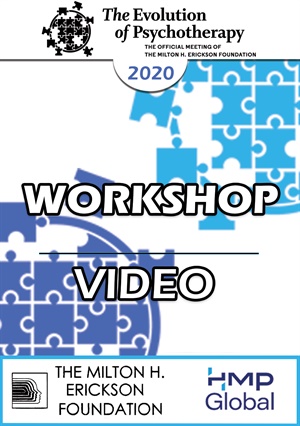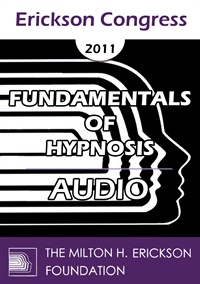
- Average Rating:
- Not yet rated
- Topic Areas:
- Topical Panels | Resistance | Psychotherapy | Therapist Development
- Bundle(s):
- EP17 Audio Streaming Build a Bundle
- Categories:
- Evolution of Psychotherapy | Evolution of Psychotherapy 2017
- Faculty:
- Judith Beck, PhD | Steven Hayes, PhD | William Miller, PhD
- Duration:
- 59:01
- Format:
- Audio Only
- Original Program Date:
- Dec 15, 2017
- Short Description:
- Clients generally understand what they need but fail to comply with their own directives and those of the therapist. Resistance will be analyzed from three different therapeutic models.
- Price:
- $15.00 - Base Price

- Average Rating:
- Not yet rated
- Topic Areas:
- Neuro-Linguistic Programming (NLP) | Workshops | Resistance
- Categories:
- Evolution of Psychotherapy | Evolution of Psychotherapy 2020
- Faculty:
- Robert Dilts, BA
- Course Levels:
- Master Degree or Higher in Health-Related Field
- Duration:
- 2 hours
- Format:
- Audio and Video
- Original Program Date:
- Dec 13, 2020
- Short Description:
- A core premise of Generative Change work is that “everything contains the potential of its opposite/complement.” The more we increase one side of a complement the more we increase the potential of its opposite/complement. When we seek to bring more of something into the world (light), we simultaneously invite its opposite (shadow). In fact, we often want to bring more of something (light) because we know its opposite (darkness). Having only one side of a complement creates imbalance. This is frequently the case in psychotherapy, where the complement to a client’s desired change shows up as a form of resistance. This workshop will show that when client’s can be supported to hold both sides of a seeming conflict or struggle from a generative state, surprising new possibilities emerge.
- Price:
-
Sale is $29.00
price reduced from Base Price - $59.00
Tags: Resistance
- Average Rating:
- Not yet rated
- Topic Areas:
- Topical Panels | Resistance | Psychotherapy
- Categories:
- Evolution of Psychotherapy | Evolution of Psychotherapy 1985
- Faculty:
- Arnold Lazarus, Ph.D. | James F. Masterson, MD | Erving Polster, PhD | Jeffrey Zeig, PhD
- Course Levels:
- Master Degree or Higher in Health-Related Field
- Duration:
- 58:10
- Format:
- Audio and Video
- Original Program Date:
- Dec 13, 1985
- Short Description:
- Topical Panel 10 on Resistance, featuring Arnold A Lazarus, PhD, James F Masterson, MD, Erving Polster, PhD, and Jeffrey K Zeig, PhD. Moderated by William McLeod, MD.
- Price:
-
Sale is $29.00
price reduced from Base Price - $59.00

- Average Rating:
- Not yet rated
- Topic Areas:
- Workshops | Brief Therapy | Psychotherapy | Resistance
- Categories:
- Evolution of Psychotherapy | Evolution of Psychotherapy 1985
- Faculty:
- Paul Watzlawick, PhD
- Course Levels:
- Master Degree or Higher in Health-Related Field
- Duration:
- 2:36:19
- Format:
- Audio Only
- Original Program Date:
- Dec 13, 1985
- Short Description:
- An introduction to the brief therapy techniques developed at Mental Research Institute; sound and videotaped examples of such interventions from actual therapy sessions.
- Price:
- $15.00 - Base Price
- Average Rating:
- Not yet rated
- Topic Areas:
- Clinical Presentations | Resistance | Psychotherapy | Therapeutic Relationship | Therapist Development
- Categories:
- Evolution of Psychotherapy | Evolution of Psychotherapy 1990
- Faculty:
- James Bugental, PhD
- Course Levels:
- Master Degree or Higher in Health-Related Field
- Duration:
- 1:00:53
- Format:
- Audio and Video
- Original Program Date:
- Dec 13, 1990
- Short Description:
- Educational Objectives: To learn interview techniques for reducing client resistances to being genuinely engaged with the therapeutic work and to be able to facilitate client inner exploration To understand the division of responsibility in which the client leads content and the therapist modulates process
- Price:
- $59.00 - Base Price

- Average Rating:
- Not yet rated
- Topic Areas:
- Topical Panels | Resistance | Psychotherapy
- Categories:
- Evolution of Psychotherapy | Evolution of Psychotherapy 1990
- Faculty:
- James Bugental, PhD | William Glasser, MD | Donald Meichenbaum, PhD | Erving Polster, PhD
- Duration:
- 56 Minutes
- Format:
- Audio Only
- Original Program Date:
- Dec 14, 1990
- Short Description:
- Topical Panel 08 from the Evolution of Psychotherapy 1990 - Resistance Featuring James FT Bugental, PhD; William Glasser, MD; Donald Meichenbaum, PhD; and Erving Polster, PhD. Moderated by Ruth McClendon, MSW.
- Price:
- $15.00 - Base Price

- Average Rating:
- Not yet rated
- Topic Areas:
- Topical Panels | Resistance | Psychotherapy
- Categories:
- Evolution of Psychotherapy | Evolution of Psychotherapy 1995
- Faculty:
- James Bugental, PhD | Albert Ellis, PhD | Otto Kernberg, MD | Erving Polster, PhD
- Duration:
- 1 Hour 2 Minutes
- Format:
- Audio Only
- Original Program Date:
- Dec 16, 1995
- Short Description:
- Panel 15 from the Evolution of Psychotherapy 1995 - Resistance Featuring James F.T. Bugental, Ph.D.; Albert Ellis, Ph.D.; Otto Kernberg, M.D.; and Erving Polster, Ph.D. Moderated by Camillo Loriedo, MD
- Price:
- $15.00 - Base Price

- Average Rating:
- Not yet rated
- Topic Areas:
- Workshops | Psychotherapy | Resistance | Therapeutic Relationship | Therapist Development
- Categories:
- Evolution of Psychotherapy | Evolution of Psychotherapy 1995
- Faculty:
- James Bugental, PhD | David Young, Ph.D. | Molly Sterling, Ph.D.
- Duration:
- 1 Hour 28 Minutes
- Format:
- Audio Only
- Original Program Date:
- Dec 13, 1995
- Short Description:
- The client's task is to try to be open to his/her inner experiencing, disclosing it to the therapist. A client discovers difficulties in doing so, thus disclosing the resistances which are isomorphic with the client's difficulties in life more generally. The therapist's task is to teach and monitor this process.
- Price:
- $15.00 - Base Price

- Average Rating:
- Not yet rated
- Topic Areas:
- Short Courses | Utilization | Resistance
- Categories:
- Erickson Congress | Erickson Congress 2007
- Faculty:
- Clifton Mitchell, PhD
- Duration:
- 1:19:16
- Format:
- Audio Only
- Original Program Date:
- Dec 07, 2007
- Short Description:
- The social interaction theory of resistance will be presented followed by application of the theory at critical junctures in the therapeutic dialogue. Errors therapists make that create resistance as well as approaches for resolving and by-passing resistance will be discussed. Utilization of "Yes but . . ." and "I don't know" responses through adjustments in the therapist's approach and through a meticulous use of language will specifically be addressed. Detailed handouts will be provided.
- Price:
- $15.00 - Base Price

- Average Rating:
- Not yet rated
- Topic Areas:
- Hypnosis | Fundamentals of Hypnosis | Resistance | Language of Hypnosis
- Categories:
- Erickson Congress | Erickson Congress 2011
- Faculty:
- Dan Short, PhD
- Duration:
- 1:39:24
- Format:
- Audio Only
- Original Program Date:
- Dec 09, 2011
- Short Description:
- Although your clientele may be voluntarily seeking treatment, you will occasionally encounter individuals who are strongly opposed to outside influence. Standard techniques and procedures often fail to achieve results with these individuals. This workshop will describe the type of approach that achieves positive outcomes in cases of complex resistance.
- Price:
- $15.00 - Base Price
Please wait ...



